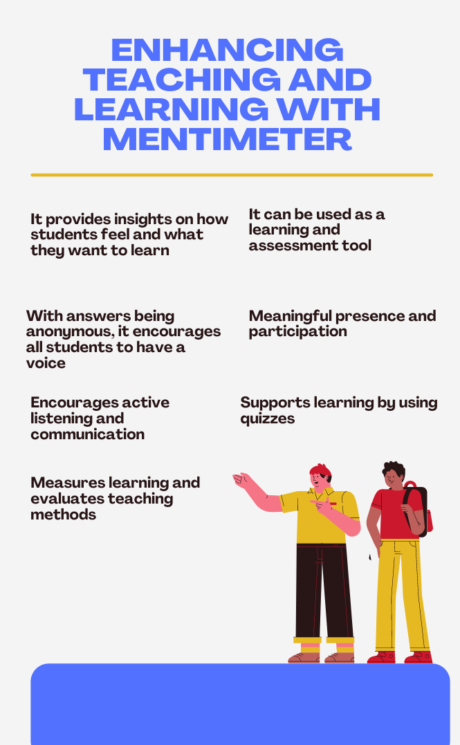Frequently Asked Questions
How can I get an account?
York St John has a university wide Mentimeter license. All staff and students can sign up for a pro license by using the Single Sign On (SSO) link.
You will be redirected to log in using Single Sign On, use your standard YSJ username and password.
I already have a Mentimeter account with my YSJ email
If you already have a Mentimeter account (free or paid) using your YSJ email address, this should convert to our site licence and you will no longer be charged for it. Any presentations or results that you already have attached to that account will be preserved.
I already have a Mentimeter account with my personal email
If you have an existing Mentimeter account (free or paid) using a personal non-YSJ email address, then you can either just create one with your YSJ email address, or we can transfer your old presentations and results over on request.
There is no limitation on the number of participants in Mentimeter so you can use it in large lecture groups as well as smaller seminar groups.

Yes, with a pro account, once the presentation has ended you can download all your results in Excel format or download the slides as PDFs.
Mentimeter
What is Mentimeter?
Mentimeter is an audience response system. It can be used to support engagement and interaction in training sessions, meetings, conferences, webinars and it is great for teaching.
- With Mentimeter you can build interactive presentations with an easy-to-use online
editor, directly from your browser. - Add questions, polls, quizzes, slides, images, gifs and more to your presentation to
make them more engaging and fun. - When you present, your audience uses their smartphones to connect to the
presentation where they can answer questions, give feedback and much more. Their
responses are visualized in real-time, creating a unique and interactive experience. - Once your Mentimeter presentation is over, you can share and export your results for further analysis and even compare data over time to measure the progress of your audience and sessions.
Some examples of how to use Mentimeter are:
• Facilitating icebreaker activities especially at the beginning of term or with new classes
• Making it easier for students to share ideas and responses, particularly in larger classes
• Enabling regular formative assessment through questions types and quiz competitions
• Collecting feedback on teaching and evaluate your own session
• Re-energising and engaging the room
• Collecting information on the prior knowledge of students
After a successful pilot over the 2018 to 2019 academic year, YSJ now has a university wide Mentimeter license. All staff can sign up for a pro license by going to https://www.mentimeter.com/auth/saml/yorkstjohnuniversity
You will be redirected to log in using Single Sign On, use your standard YSJ username and password.

Guides and Support
- Getting Started with Mentimeter
- Presenting with Mentimeter
- Add your Mentimeter Questions to a PowerPoint Presentation
- Combine Mentimeter with your PowerPoint Presentation
- Import your Existing PowerPoint into Mentimeter
- How to create your first presentation
- How can I vote on a Mentimeter presentation?
- How to use the different question types?
- How to present?
- Live presentation or remote survey
- Export and analyse results
- How to reset results to use a presentation again
- How the voting pace affects your presentation
- How to share a presentation?
- Presentation PDF and screenshots
- Embedding Mentimeter into Moodle
- How to use Mentimeter in MS Teams
- Creating a Mentimeter Quick Form
You can also access extensive guides on the creation of resources on the Mentimeter website. If you need support with using Mentimeter, contact the TEL team at YSJ tel@yorksj.ac.uk, go to the Mentimeter Help Centre or contact support@mentimeter.com
Reading
Mentimeter Walkthrough - Make your teaching more engaging and inclusive
This document provides examples and detailed information around how each question type works and how and when it can potentially be used.
Research on Mentimeter's impact in an educational environment
A short overview of some of the research papers on the impact of Mentimeter (or student response systems) on the teaching and learning experiences.
Online Support
- Mentimeter's Help Center - everything about how Mentimeter works
- Mentimeter's Youtube page - full of inspirational and how-to videos
- Mentimeter's Blog - full of inspiration
- Mentimeter webinars - Watch older Mentimeter webinars or sign up for upcoming ones (public generic webinars)
- Mentimeter templates - Ready to use templates on various topics - for direct use or just for inspiration
- hello@mentimeter.com - For any questions related to how Mentimeter works your colleagues can always reach out to this email address or use the blue chat bubble on the platform to chat with a Support representative.
Audience response systems
Kastner discusses the wide range of benefits afforded by audience response systems, from increased student attendance and improved student engagement to additional opportunities for discussion and debate and easier identification of student misunderstanding of course content (2016). In her own mixed methods study she finds audience response systems to be a ‘pedagogically valuable tool’ which she found to have a positive impact on grades.
Nevertheless, it is vital to use audience response systems with learning objectives in mind and only when such systems will support learning. Nielsen et al. discuss how a number of issues such as 'poor preparation, inconsistent use of [audience response systems], not having a clear goal of [audience response system] use, and bad question design' all contribute to negative attitudes from students towards these systems being used.
While the positive feedback collected at York St John around Mentimeter use so far has far outweighed negative comments, we encourage teaching staff to continue to use Mentimeter only when appropriate.
Gamification
Mentimeter involves elements of gamification particularly in the quiz question type. Cameron and Bizo (2019) highlight that the gamification of instructional activities can ‘promote more effective learning environments by increasing problem-solving, critical-thinking and competence in the classroom’ (p.1). Although their research showed no correlation between attainment and the use of a gamified audience response system, they nevertheless found that its use fostered ‘engagement, enjoyment’ and an immersive learning experience.
References
Cameron, K., & Bizo, L. (2019). Use of the game-based learning platform KAHOOT! to facilitate learner engagement in Animal Science students. Research in Learning Technology, 27. https://doi.org/10.25304/rlt.v27.2225
Kastner, M. (2016) ‘The Use of an Audience Response System to Monitor Students’ Knowledge Level in Real-Time, Its Impact on Grades, and Students’ Experiences’ 49th Hawaii International Conference on System Sciences (HICSS) p. 104. doi: 10.1109/HICSS.2016.21.
Nielsen, K., Hansen, G., & Stav, J. (2013). Teaching with student response systems (SRS): teacher-centric aspects that can negatively affect students’ experience of using SRS. Research in Learning Technology, 21. https://doi.org/10.3402/rlt.v21i0.18989
Further Reading
González, A. Turning a traditional teaching setting into a feedback-rich environment. Int J Educ Technol High Educ 15, 32 (2018) doi:10.1186/s41239-018-0114-1
